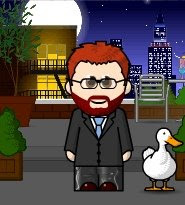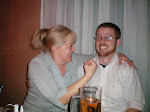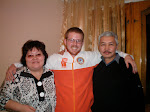I can’t say that I actually feel like I’m in the Peace Corps as I wake up in Petropavlovsk, where I will be living and teaching the next two years. Last night we arrived to the soviet-built train station under the cover of dark after a surprisingly enjoyable 31-hour train ride from Almaty. In stark contrast with the village where I have been living for nearly 3 months of Peace Corps technical and Russian language training, I step off the train to see a parking lot full of cars surrounded by old five-story apartment buildings. My breath is suddenly visible as I note the drop in temperature indicative of both the nights on the Kazakhstani steppe and the North in general. I breathe deeply, thankful for the fresh air, and realize that the air really is fresher than in the coal and trash-burning towns in the South. My Kazakhstani counterpart (Saule), and I meet her waiting husband (Serikbai) and 16-year-old son (Nursultan) who promptly offer to share the load of my (typically American) excessive amount of luggage. I thank them in my limited Russian, zip up my coat and follow them home.
I woke up this morning after a fitful night of sleep, unaccustomed to a new bed in a new apartment, but my weariness dissipates as I remember where I am and what new and amazing things another day in Kazakhstan might bring. I breathe deeply and at once I can tell that many things are different. Primarily, the lack of coal and wood smells tells me that the apartment building is heated centrally, and the lack of my own body odor reminds me of the hot running water that magically appeared at my command from a metal pipe in the next room the night before. I hear Saule in the kitchen talking to Serikbai in Kazakh speckled with Russian verbs and nouns. Back in Uzunagash I hear just the opposite. I hear the teapot whistling and a dish rattling as breakfast is being prepared, and I look at the clock by my borrowed bed. It is 6:35 and I persuade my muscles to cooperate in my attempt to get out of bed, despite the counteractive efforts of the darkness outside my window.
Besides the ever-present black tea with sugar and maybe milk, breakfast consists of an egg, sausage and parsley omelet, dried apricots, and kashi, a Kazakhstani relative of American cream-of-wheat. As I sit down, Saule corrects my Russian pronunciation of “good morning,” and commences mediating my conversation with Serikbai. Conversation comes easily and naturally with my new northern friends, and I learn five new Russian words about his job at the macaroni factory that employs a large percentage of Petro residents. I enjoy my breakfast, noting that my breakfast and the kitchen in which I ate it could easily exist in any US city. I am feeling more at ease and comfortable than I have since landing in Almaty in August.
We finish breakfast and Saule says, It is time to get dressed up. I decide it is too early to explain the difference in connotation between to get dressed and to get dressed up, and head to my room, thanking her for a wonderful meal. I’m still not used to wearing ties almost every day, and smile to myself thinking, Maybe she can tell that about me -- by my previous standards, I am dressing up.
We bundle up and walk out the door at 7:30 to see the beginnings of daylight on the lower edges of the sky. Saule informs me that School #8 where I will be working is a twelve-minute walk away – nine if it is very cold out – and we make our way to the school. The street is sparsely populated, in my opinion, for a city of 250,000 people, but it is still early and most peoples’ work day begins at nine. The street is lined by trees already lacking most of their leaves and a small city bus with many empty seats drives by, a rarity to see in the overcrowded city of Almaty. There is only one bus stop between my house and the school, explains Saule, so it is almost always quicker to walk than to wait for the bus. As we walk, not too briskly, I marvel at the comparative lack of trash in the streets and gutters.
We walk into School #8, a four-story building that reminds me of a hospital with an inner courtyard, and I brace myself for the onslaught of stares and shouts of Hello! and What’s your name? These are so common in my village that I have nearly become unaware of them. The greetings from afar don’t materialize, but I am aware of the stares. I am not from here. They can tell. I am introduced, in Russian, to a few teachers and an assistant principal (zavuch) milling about in the main lobby and I get the feeling they assume I know no Russian. At each introduction they seem to be talking about me, while periodically offering polite smiles in my direction. And at each introduction they are pleasantly surprised when I pipe up and greet them in Russian, realizing that they can also talk to me, although slowly, as I remind them.
The morning progresses in a repeating cycle of classes in which I introduce myself to the English classes, and then sit in the back to observe my counterpart teach. I tell each class about my hometown, my family, my hobbies and my newly acquired job as their co-English teacher for the next two years. In each class, at the mention of two years, at least 3 pairs of students gape and turn to their desk mate with eyes that scream, Really?! Two Years?! Wow! I smile and nod away their (and maybe some of my) disbelief that I really will spend two years of my life living and working at a school in Kazakhstan. Sometimes it doesn’t seem at all real.
I get a tour of the school building, eat lunch in the cafeteria, use the high-speed internet that they say is available anytime I like, and meet the rest of the staff. They are impressed by my Russian abilities – Saule likes to remind them that I hadn’t known a word of Russian before moving here – and even more impressed when I demonstrate my severely limited ability to speak in Kazakh. The Kazakh language had been suppressed during the soviet-era, and now its use is a part of the growing sense of Kazakh ethnic pride. More than a communicative tool (especially in the north), the Kazakh language has served as a brownie-point collector with the local people I meet and live with. They really seem to appreciate my effort to learn not only their language of business, but their language of heritage as well.
A short driving tour of the city in the afternoon reveals the proximity of most important places in the city and the central location of my counterpart’s apartment building. A new, large, beautifully painted blue and white mosque sits on a corner a few blocks from the center, and a short drive out of town brings us to the scenic Ishim River. We visit a couple bazaars where I come face to face with quantities and cuts of raw meat I had never before encountered. Cow tongue, heart, liver, and brain, as well as the parts commonly consumed in the US, line the tables that make an island around the large racks from which hang the uncut animals. Two men struggle to chop the side of a cow using a large axe and a dinner-table sized chopping block. I am thankful not to be prone to queasiness, although I spent most of my time admiring the fruits and candies while Saule and Serikbai shopped for dinner.
Seven o’clock at the house, dinner is manti, a national dish of meat dumplings that has since become my favorite in-country. About the size of a small potato, the dumpling-esque dough is filled with small cuts of beef, bell peppers and onions. I have had it in the South with pumpkin, and I’ve added it to my list of things to learn how to make before I head home in 2009. I have explained that I don’t drink as much chai (tea) as they do for fear of caffeine dependence, so I’m not pressured to drink it as much. However, the national slogan should be Kushe, Kushe (Eat, eat), because at every dinner table that has received me (and there have been quite a few), I haven’t heard any phrase more than that. Not wanting to disappoint my hosts, nor waste any of the delicious food, I eat until it hurts.
After dinner I retreat to Nursultan’s room where I am staying and, through my gluttonous pain, nearly laugh at loud as I notice for the first time the sign on the door that reads, in English: Do not ENTER. DANGER! Territory of SCARY! Oh, to be 16 in Kazakhstan… I lie down for a while to let my stomach begin problem solving the sudden increase in matter, while I begin to process the last handful of hours. Between each thought about how much I like my new site and how excited I am to be moving here for two whole years, I wonder, Can this really be the Peace Corps? I won’t be living in a hut – not even in a house in a remote village. I won’t be pulling my water out of a well, or boiling it on a gas stove for my weekly bath. I can’t say I’ll be roughing it, except maybe when it is -40 oC. Even then, I’ll be hustling, wearing my NorthFace winter boots, from one heated building to another. These thoughts drift in and out of my head as my overstimulated and overworked body shuts down and I doze off. Around ten o’clock I wake up in much the same manner I did fifteen hours earlier, slowly remembering where I am. I also have the sense that maybe double-digit quantities of manti isn’t something I should do every day. I stumble into the living room and hear the clinking of dishes in the kitchen and hope first, that they are not eating again, and second, that if they are they won’t invite me. I round the corner and see that, indeed, the chai is poured and yes, Saule is motioning for me to sit down. I silently apologize to my digestive tract, and take my place across the table.
At first, Saule wants to know what I thought of the city, the school, the children, the other English teachers. We talk as I sip my tea and nibble on a cookie. I share my appreciation of the positive reception I received and my excitement about Petropavlovsk in general. We talk about the Peace Corps. We talk about Almaty and the village where I have been training. We talk about the differences between British and American English. We talk about Kazakhstan. We talk about Borat. We talk about America.
What do you do with your trash here? I ask, wondering if they simply burn it like in the village.
Saule replies, Every week someone empties the large bin outside the building and takes it away.
I get a little excited about the first mention of trash collection, and venture onward: Is there any such thing as recycling here? I’m not hopeful of her response.
No, but we have heard of it. It takes a large company to start doing it.
That’s true. What can we do about it?
The question jumped from my mouth without really having thought about it, knowing that most likely there is nothing we can do about it. But that is why I’m here. Ask the hard questions, have the late night discussions, work my butt off to teach these kids English. And while I’m at it, maybe we’ll have a big Earth Day celebration in April, and maybe one of the kids will take it to heart, and maybe that kid will grow up and start a recycling company in Petro, and maybe, just maybe… It is my job to be young, optimistic, naïve and idealistic, right? As I check the time and notice it is no longer Monday and the teapot is empty, I give a contented sigh and say, Well, I think we’ve solved the world’s problems and we can rest easy. Saule laughs heartily and makes me glad that I am where I am, doing what I’m doing. I crawl into bed, amazed at my situation, wondering how I got myself into trying to solve waste management problems in Kazakhstan, and I realize that yes, I am indeed in the Peace Corps.
Subscribe to:
Post Comments (Atom)
.jpg)








No comments:
Post a Comment